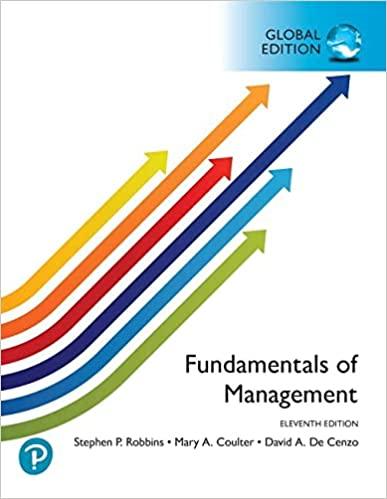If trust is a fundamental part of leadership, how does an organization recover when the trust is
Question:
If trust is a fundamental part of leadership, how does an organization recover when the trust is lost? This is a question Fédération Internationale de Football Association (FIFA)
recently had to ask itself after a series of scandals rocked it to its foundations.
Football is not just a sport; it is very big business. Deloitte estimated the revenue for the UK premiership alone for the 2016–17 season at $4.5 billion and expected this to rise to $5 billion for 2018–2019.81 Founded in 1904, FIFA is the governing body responsible for running world football. One of its most important responsibilities is managing the bidding process for countries wishing to host the World Cup, the most-watched sporting event in the world. Countries spend millions of dollars preparing their bids and expect a fair, transparent process.
Long before FIFA President Sepp Blatter declared Russia the host of the 2018 World Cup and the small Gulf state of Qatar winner of the next in 2022, questions were being asked about the bidding process. For these two latest events, allegations were made that countries had colluded to trade votes, which Blatter confirmed in 2011, promising an internal investigation.
In July 2012, after further allegations were made, Blatter and FIFA tried to answer their critics by employing Michael J.
Garcia, an American attorney. His job was to investigate corruption at FIFA, and he took a good look at the 2018 and 2022 World Cup bids. By September 2014, Garcia had compiled a comprehensive, 350-page report. However, FIFA’s own ethics committee refused to publish the complete document, preferring instead a much shorter summary, casting more doubt on FIFA and ultimately leading to Garcia’s resignation after he claimed the facts had been misrepresented.82 Things went from bad to worse for FIFA at the 2015 FIFA annual meeting in Zurich, Switzerland, when a number of dawn raids were carried out by U.S. federal authorities and seven FIFA officials were arrested in what was the culmination of an investigation lasting several years. In total, 14 people were detained over corruption allegedly involving more than $150 million worth of bribes dating back 24 years.83 Sepp Blatter was re-elected as President that same year;
however, this was to be short-lived. After only four days,
he announced his intention to resign, asking the congress to appoint a successor as soon as possible. In the September of the same year, Swiss prosecutors opened proceedings against Blatter over a number of financial irregularities, including a “disloyal payment” to Michel Platini, his possible replacement as President. In December 2015, the FIFA ethics committee banned both Blatter and Platini from all footballrelated activity for eight years.
The year 2016 saw the appointment of a new president,
Gianni Infantino, but more importantly the passing of a number of reforms focused on accountability and transparency within the organization and aimed at repairing FIFA’s tarnished reputation.
It is now Infantino’s role to preside over this new FIFA and rebuild trust with clubs, countries, players, and fans.
Discussion Questions
1. What does the number of senior FIFA executives being investigated say about the culture at FIFA?
2. Of the 8 suggestions for building trust, which do you think should have been the focus for FIFA? Think about Michael J.
Garcia’s report.
3. What does the case say about Blatter’s style of leadership?
4. In 2011, when asked about the crisis at FIFA around the rumors of financial irregularities, Blatter downplayed the allegations dismissively. Which of the 5 dimensions of trust do you think Blatter was failing to demonstrate here?
5. For Infantino to succeed, what style of leadership do you think would be most effective?
Step by Step Answer:

Fundamentals Of Management
ISBN: 9781292307329
11th Global Edition
Authors: Stephen P. Robbins, Mary A. Coulter, David A. De Cenzo





